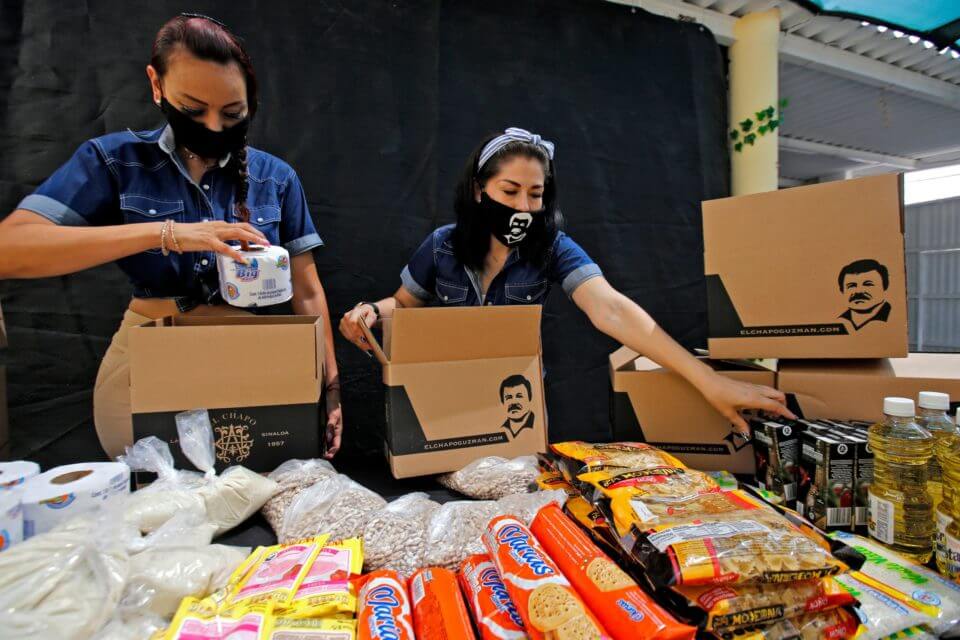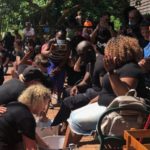
“In Mexico, the most effective influencers are either politicians or drug lords.”
Influencers need attention. In order to gain followers and the extensive recognition they seek, influencers will do whatever it takes to attract the affection of their target audiences. One of these strategies—and which is one being heavily replicated across social media—is for an influencer to give away money, food, and clothes (often to economically disadvantaged people). This is often done in order to generate views for his or her social media page, as well as to portray the influencer or would-be influencer as a marvelous person who cares for others. In Mexico, the most effective influencers are either politicians or drug lords.
It is not unusual for politicians in Mexico to use clientelistic strategies to create relationships with marginalized communities. While campaigning—in order to attract voters—politicians travel their constituencies giving away groceries, food baskets, and even televisions. Once their campaigns have ended, they continue to use similar schemes to maintain the trust of the people—and to distract voters from any possible wrongdoings on their part. The people who receive these products are often so vulnerable that even a small amount of aid may enable them to feed their family for a week, henceforth sealing a bond with that politician.
As of late, the Coronavirus (COVID-19) pandemic has spread rapidly across Mexico and has, in turn, been greatly affecting the most vulnerable. All the while, violence—including homicides, femicides, and clashes between different cartels—has not slowed down. In the majority of Mexican states, drug cartels have continued to commit their crimes, and the power that criminal organizations have in Mexico cannot be overstated. To this point, many communities are controlled entirely by cartel members through the use of force or, in some cases, by drug lords who become local political candidates.
However, COVID-19 has forced many small and medium-size businesses to close, and people no longer have enough to take care of their their families, let alone pay their derecho de piso.
There are several parts of the country where drug cartels have a particularly strong presence. For instance, the Gulf Cartel can commit crimes with near-total impunity inside the territories it controls in the state of Tamaulipas, in the north of Mexico. One of the most common strategies used by the Gulf Cartel (and most cartels) is demanding small and medium-sized businesses pay for “protection”—or what in Mexico is called “derecho de piso.” The cartels are also known to extort and kidnap civilians and then later expose their bodies in public to ensure that nobody dares to question their authority. However, COVID-19 has forced many small and medium-size businesses to close, and people no longer have enough to take care of their families, let alone pay their derecho de piso.
According to two on-the-ground sources based in the southeast of Morelos, a state dominated by Los Rojos and Cartel Jalisco Nueva Generación (CJNG), drug cartel leaders announced they would stop collecting their derecho de piso from small-business owners. Sources we spoke with, who work at a local market, have to pay at least $10,000 Mexican pesos (approximately $441 United States dollars) per month to avoid being kidnapped, robbed, or killed. “We are afraid of what they might do—the strategies they might use to keep controlling the community. We are more scared about possible kidnappings or extortions than getting infected by the disease while selling our products,” one worker told us.
However, as COVID-19 continued its spread in these states—thereby badly hurting local business owners—several drug cartels were spotted delivering food baskets, which included canned food and toilet paper. Señor 46 Vaquero, a leader of the Gulf Cartel, started making deliveries in several Northern communities. While he did this, his accomplices took photographs with the recipients and uploaded them to social media. Soon afterwards, several cartels replicated this scheme with their own personal touches. For instance, members of the Sinaloa Cartel used special boxes and bottles designed by the daughter of the notorious kingpin Joaquín Guzmán “El Chapo.” Meanwhile, like politicians on a campaign, CJNG played music, delivered fawning pamphlets about its leaders, and recorded the goings-on with drones, as they delivered groceries in the State of Jalisco.
However, the big cartels are not the only ones engaging in this practice. Smaller and lesser-known organizations are also giving away food baskets to vulnerable populations. While doing so, they are gaining more attention—and possibly, in turn, more territory and affiliates. For example, “El Señorón,” a local drug chieftain affiliated with the CJNG in the state of Morelos even created his own logo while distributing plastic bags with toilet paper, cookies, and other confectionaries to truck drivers and their families. An associated cell of the Gulf Cartel, “Grupo Sombra” did not only distribute groceries to impoverished communities in the state of Veracruz but also attached a printed message that read, “As it is noble to command, it is to know how to obey. And those who know how to obey will be better off…Stay at home for the good of all.” In the state of Michoacán on Mexico’s western coast, the criminal group “Los Viagras” is considered to be a “benefactor” of rural communities.
Thanks to these food deliveries, local populations are now less inclined to betray cartels. While this is hardly a new strategy, it is particularly noteworthy to be watching it play out during this pandemic, as well as to observe how the cartels have been leveraging social media to broadcast what they have been doing. This all takes place as the Mexican federal government has done little to help the country’s economically-disadvantaged population This has been partnered with the aforementioned surging homicides throughout the country thus far in 2020. And just this week, a federal judge, who handled organized crime cases, was murdered along with his wife at their home in Colima, a state on Mexico’s Pacific Coast.
President Andrés Manuel López Obrador recently commented about the increase in homicides and violent crimes throughout the country. He indicated that he was also well aware that drug cartels were handing out groceries as the pandemic lockdown continued. And, as he put it at the press conference, “Don’t hand out groceries, please back off. Think about your families, about yourselves.” Despite his declarations seeking to discourage criminal activity, including his famous “What would your mothers say?” line, little has improved for the narco-dominated communities throughout the nation. Furthermore, as cartels distribute food in these times of need, they can appear almost as sources of moral authority for impressionable young people. So, while President López Obrador leaves much to be desired in terms of responding to Mexico’s ongoing crises, drug cartels and their kingpins are becoming recognized influencers in communities across the country. In the end, people will most likely stay loyal to them, whether on account of fear—or as a simple act of survival during these difficult times.











